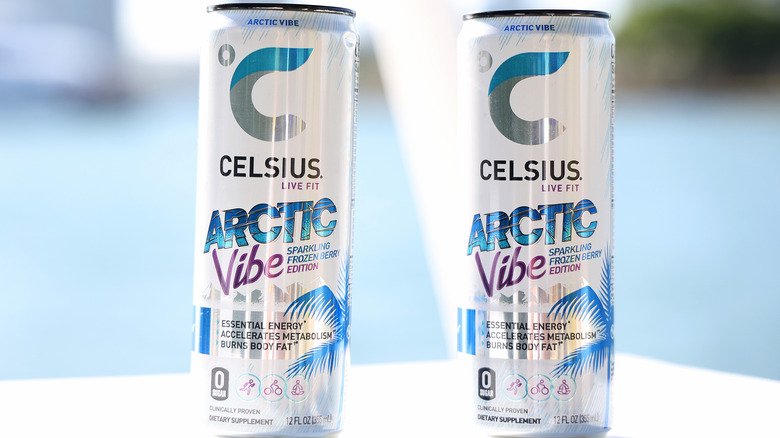No, Sugar-Free Energy Drinks Won't Save You From The Crash
Most people are familiar with the concept of a sugar crash. This occurs when you consume more refined sugar than your body is used to. That consumption results in a temporary surge in energy due to a spike in your blood sugar levels. However, as your body works to balance this out with insulin, you may start to feel symptoms of a "blood sugar crash" like your energy levels depleting, jittery feelings of unease, or even anxiety.
This, paired with a desire for healthier energy drink options, has led many consumers to opt for sugar-free energy drinks when they need a pick-me-up. Unfortunately, these "clean" beverages that have vitamins and little to no sugar won't save you from the inevitable caffeine crash. While natural forms of caffeine that don't rely on a sugar high to provide energy are better options, they are still unlikely to give you sustained energy levels throughout the day.
For example, the caffeine in coffee and tea works by preventing adenosine receptors from properly signaling to your brain that you should be getting sleepy. That ends up blocking the sensation of tiredness. While this can help you remain awake and focused temporarily, it won't prevent that inevitable caffeine crash. This is due to the fact that your body is still increasing these adenosine levels throughout the day. Therefore, once the caffeine starts to wear off in about four to six hours, you will likely feel a surge of sleepiness.
Even the healthiest sources of caffeine will lead to a crash
Caffeine is a world-favorite drug. That is because people see caffeine in coffee or tea as the healthiest option for promoting alertness. As a result, many sugar-free energy drinks often include coffee bean or green tea extracts. Oftentimes, popular energy drinks also contain high amounts of vitamins B6 and B12 because they are water-soluble vitamins that help to produce natural energy as your body metabolizes them. Another common ingredient in these beverages is taurine, which is an amino acid linked to reducing fatigue. Guarana, a caffeinated plant extract, is common as well.
When you have energy drinks every day, the ingredients work to give you energy temporarily. However, if you ironically find yourself feeling tired after consuming a sugar-free energy drink, it's likely because of a caffeine crash as opposed to a sugar crash. While caffeine will initially increase your heart rate, energy, and focus, the aftermath can leave you feeling more exhausted than before.
The Journal of Clinical Sleep Medicine also notes that consuming caffeine within six hours of your bedtime can negatively impact your sleep quality, resulting in less sleep and likely causing you to reach for more caffeine the following day. Caffeine reliance can lead to a crash if you don't consume your normal amount, with symptoms like withdrawal headaches, brain fog, and difficulty concentrating. While sugar-free energy drinks may help you avoid a sugar crash, consuming caffeine could leave you with similar side effects.

